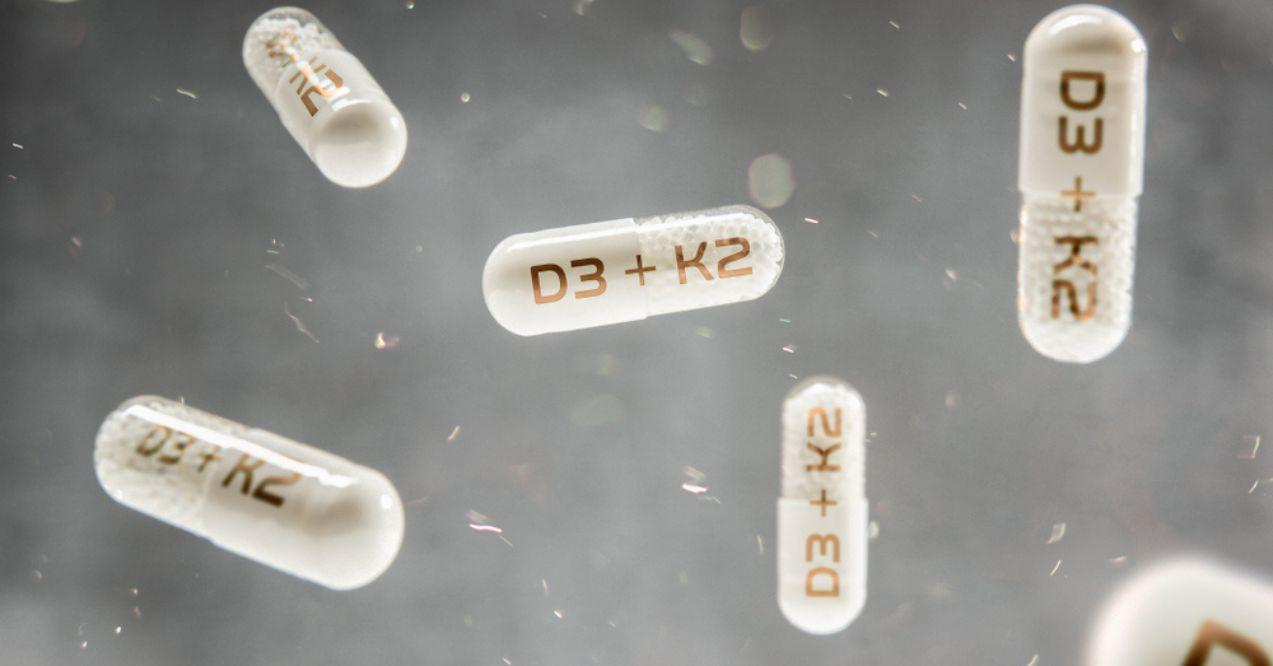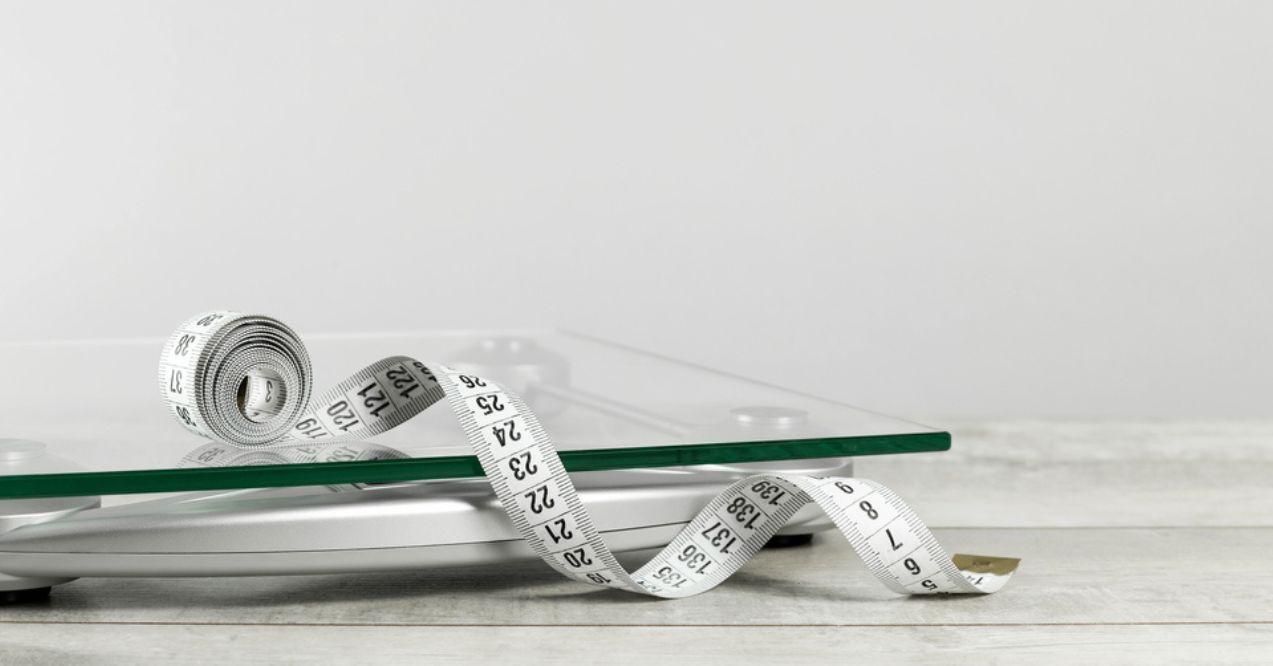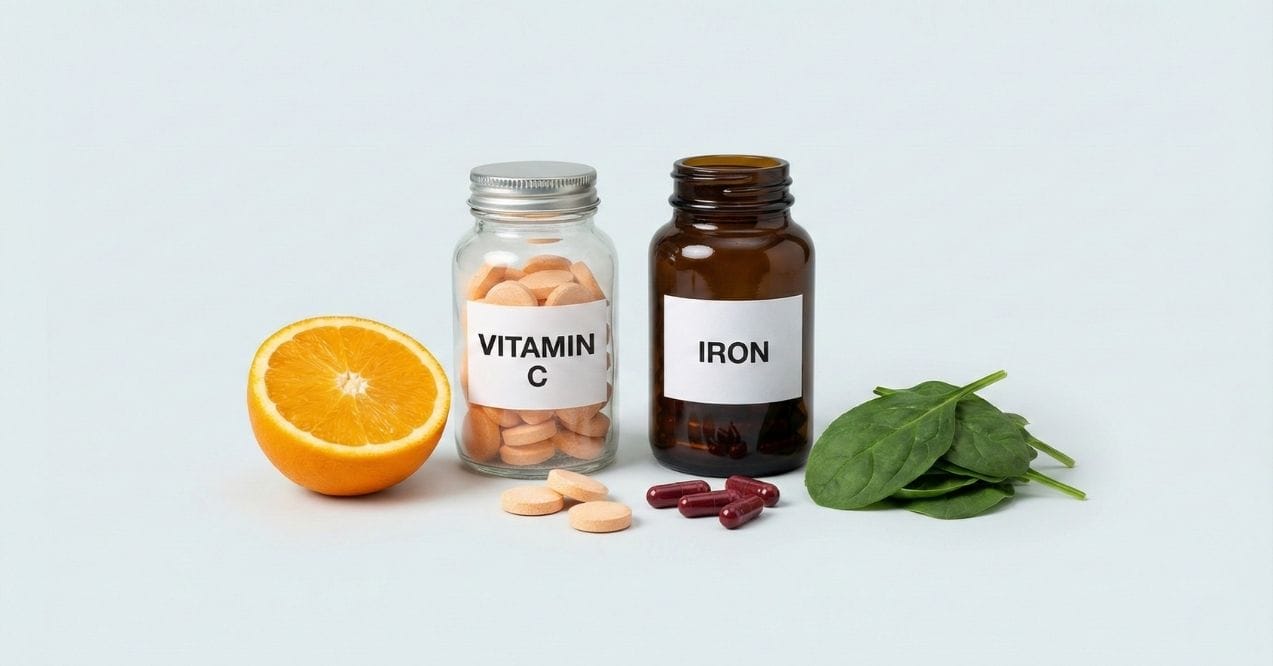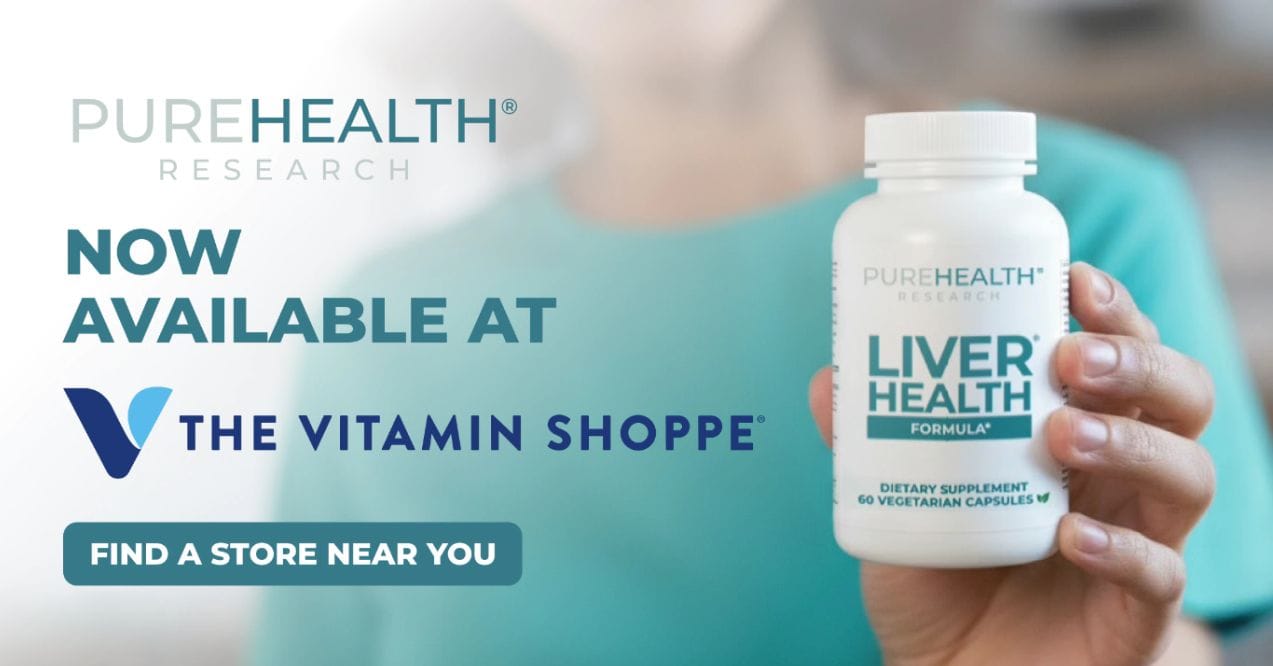Should I Take Vitamin D3 With K2 Together?
Use vitamin D3 with K2 to unlock your vitality. Discover their synergy for heart and bone health. Enhance your well-being today.


Taking vitamin D3 with K2 has become pretty common nowadays, but what’s the big deal about it? In truth, these two are crucial where optimal body functions and general well-being are concerned. As age catches up, their importance seems to double or triple in value. For the most part, this happens because they work synergistically to support bone health. Specifically, vitamin D3 promotes calcium absorption. By doing so, it boosts bone density while also supporting overall immunity.
Balancing the other part of the equation, vitamin K2 promotes the utilization of calcium in the body, ensuring that this mineral stays away from the arteries. In effect, thanks to the work of this vitamin, there is little to no plaque formation along arterial walls, preventing arterial calcification and the resulting cardiac events that come alongside it. The vitamin K2 also directs calcium to teeth and bone, bolstering their strength.
Together, the vitamins D3 and K2 are a powerful pairing, and more so for older adults. The consensus within the scientific community affirms this, particularly in regard to bone health. The two are the body’s first line of defense against osteoporosis and, as has just been discussed, arterial calcification. As we seek to exhaustively answer the question “Why take vitamin K2 with vitamin D3,” we need to understand their complementary functions. Here, we get to explore the symbiotic relationship they share and how impactful it is to healthier and happier golden years.
What Is Vitamin D3 and K2 Good For?
Do you need vitamin K2 with D3? Absolutely! These two are your ace in the hole for proper bone and cardiovascular health. Breaking it down further, here’s exactly how the combo works.
Vitamin D3 and K2 are Good for Heart Health:
- Vitamin D3 reduces inflammation. It also regulates blood pressure. Hypertension is a silent killer, highlighting the importance of vitamin D.
- This vitamin also reduces your risk of a cardiac event by alleviating arterial calcification.
Vitamin D3 and K2 are Good for Bone Density:
- For hard and strong bones, calcium and phosphorus, in a compound known as calcium phosphate, must be present in the required amounts. Vitamin D3 ensures this is the case by actively boosting calcium absorption in the body.
- Evidently, the presence of calcium along the walls of arteries is a worrying eventuality. Thankfully, vitamin K2 is proactive in this sense, promoting the utilization of calcium in bone and teeth, where it is much needed.
Vitamin D3 and K2 are Good for Overall Immunity:
- What do you know about the immune system? Composed of cells, organs, and other proteins, it defends the human body against infections. Vitamin D3 supports the system in identifying and neutralizing pathogens.
- Once the immune system identifies a pathogen, an immune response follows. Vitamin K2 boosts the immune responses to fight off foreign and disease-causing organisms.
Do You Need Vitamin D3 With K2?

When taking one of these vitamins, it is crucial that its counterpart supplements it. How, you ask? Let’s get into the scientific territory, then, for an all-round understanding of how the two work together.
According to this study carried out in Japan, “Treatment with 1 alpha-hydroxyvitamin D3 (alfacalcidol) slightly reduces bone turnover, sustains lumbar bone mineral density (BMD), and prevents osteoporotic vertebral fractures in postmenopausal women with osteoporosis, while vitamin K2 (menatetrenone) enhances gamma-carboxylation of bone glutamic acid residues and secretion of osteocalcin, sustains lumbar BMD, and prevents osteoporotic fractures in patients with osteoporosis.”
Although the study group in question was postmenopausal women with osteoporosis, the research team opined that their findings would play out in a similar way across different cohorts of older adults. Additionally, they established that the presence of vitamin D3 enhances the function of vitamin K2 both in vivo and in vitro. The study concluded that clinicians should prescribe combined treatment to deal with osteoporosis.
Within the context of this article, where the focus is more on preventive than curative action, the key takeaway is that in enhancing gamma-carboxylation of bone glutamic acid residues, vitamin K2 guides calcium to the right places in the body. Scientific evidence shows that intake of vitamin K2 inhibits arterial stiffening and calcification. Increased intake of the vitamin could assist in lowering calcium-associated health risks.
Why Take Vitamin D3 With Vitamin K2?
In truth, the science of it all can be a bit complex. This is exactly why we’re taking another route, where we break down the jargon from the scientific articles discussed above.
So, what is gamma-carboxylation of bone glutamic acid residues? Let’s break it down in a more relatable way. Think of your bones as a construction site, and the workers are proteins — the builders of bone health. Now, these proteins are like strings of beads, with each bead representing a different type of amino acid, one of them being glutamic acid.
Glutamic acid is a special bead that can undergo a makeover, a bit like adding a unique tag or accessory. We call this transformation gamma-carboxylation — a chemical tweak that gives the glutamic acid bead a specific role.
In our bone construction site, this modification is like the workers wearing special gear that helps them guide calcium to the right places, such as the bones and teeth. It’s their way of making sure calcium goes to the correct spots, avoiding mix-ups like the mineral ending up in the wrong places, such as the walls of arteries, causing potential trouble.
So, gamma-carboxylation is basically the workers putting on their gear — a molecular adjustment that ensures they do their job right — and directing calcium where it’s needed for strong and healthy bones. In essence, vitamin D3 starts the calcium absorption party, and vitamin K2 ensures that calcium gets to the right places.
How Vitamin D3 and K2 Work Together?

In this intricate biochemical dance, vitamin D3 helps with the absorption of dietary calcium in the intestines by activating genes for calcium transport proteins. Vitamin K2 orchestrates protein carboxylation, modifying osteocalcin and matrix Gla-protein (MGP), enhancing their calcium-binding abilities. Modified osteocalcin, crucial for bone formation, efficiently binds calcium, promoting its incorporation into the bone matrix for mineralization.
Simultaneously, vitamin K2 safeguards arterial health by preventing calcium deposition, maintaining arterial flexibility, and reducing cardiovascular risks. Together, vitamin D3 and K2 harmonize to regulate calcium. While D3 facilitates absorption, K2 ensures directed calcium utilization for bone health, preventing accumulation in undesirable areas.
This collaboration showcases vitamin D3 and K2’s nuanced efforts in optimizing calcium metabolism for skeletal integrity and cardiovascular health.
Combining Vitamin D3 With K2
The combination of vitamin D3 and K2 is imperative, supported by research showcasing improved bone density and cardiovascular health outcomes. As you now know by heart, vitamin D3 takes the lead in calcium absorption, activating genes for transport proteins, while vitamin K2 oversees protein carboxylation, optimizing calcium binding.
Studies highlight the synergistic impact of this approach on bone density. Vitamin K2, through protein modification, enhances calcium-binding capabilities, ensuring efficient incorporation into the bone matrix for optimal mineralization.
Furthermore, the collaborative effort between vitamin D3 and K2 plays a pivotal role in cardiovascular health. While D3 facilitates calcium absorption, K2 directs its utilization, preventing undesirable deposition in arterial walls. Research underscores the significance of this coordination in maintaining arterial flexibility and reducing the risk of cardiovascular issues.
Vitamin D3 and K2 Benefits
Having come this far, do you feel convinced enough to add these to your diet? If not, here are vitamin D3 and K2 benefits to rope you in.
1. Cardiovascular Health

Vitamin D3, synthesized in the skin upon sunlight exposure, orchestrates the synthesis of calcium-binding proteins, fostering calcium absorption in the gut. Meanwhile, vitamin K2, a cofactor in the activation of matrix Gla-protein, directs calcium away from arterial walls, mitigating vascular calcification. Like a harmonious ballet, this dynamic duet stalls calcium deposition in arteries, averting atherosclerosis and promoting arterial flexibility.
2. Immune Health

Vitamin D3 amplifies immune cell functionality by modulating gene expression, fortifying both innate and adaptive immune responses against pathogens. Concurrently, vitamin K2, a cofactor in protein carboxylation, optimizes the activities of immune cells.
In essence, vitamin D3 assumes the role of an immune modulator, orchestrating a proactive immune defense, while vitamin K2 fine-tunes the molecular machinery to ensure peak performance. This collaborative synergy culminates in a meticulously regulated immune response.
3. Weight Management

Although still an area in need of more research, early signs suggest that vitamin D3 influences adipose tissue and insulin sensitivity, crucial components of glucose homeostasis. Its regulatory role extends beyond bone health, encompassing metabolic pathways pertinent to weight control.
Simultaneously, vitamin K2, by facilitating proper calcium utilization, potentially mitigates adiposity-related processes. Through nuanced regulatory mechanisms, vitamin D3 and K2 collectively contribute to a paradigm, underpinning their potential relevance in the landscape of weight management strategies.
4. Overall Wellness

Where holistic wellness is concerned, vitamins D3 and K2 actively contribute to physiological balance. Vitamin D3 extends its influence beyond skeletal health, potentially impacting mood regulation and fortifying immune responses. At the same time, vitamin K2, functioning as a cofactor in calcium metabolism, directs this mineral towards bone deposition, implicating its role in cardiovascular health and joint integrity.
This collaboration underscores their scientific relevance in orchestrating a comprehensive approach to overall wellness. The synergistic interplay between these vitamins manifests across diverse physiological domains, reflecting a nuanced perspective on their potential contributions to aging well.
Natural Sources of Vitamin D3 and K2
If you are all about dietary intake, the following foods will suit you well where vitamins D3 and K2 are concerned:
Food sources of Vitamin D3:
- Tuna
- Mackerel
- Salmon
- Egg yolk
Food sources of Vitamin K2:
- Grass-fed meat
- Grass-fed liver
- Hard cheese
Incorporating these foods into your daily diet supports bone health, aids in immune function, and contributes to overall well-being by ensuring a balanced intake of these crucial vitamins.
How to Choose the Best Vitamin D3 With K2 Supplements
When dietary intake of essential nutrients falls short, supplementation becomes your go-to solution, especially when aiming to boost your energy levels with vitamins and supplements for optimal health. To ensure you’re selecting the most effective Vitamin D3 with K2 supplements that can also contribute to your vitality, consider the following key factors:
- Bioavailability – Opt for D3 in the form of cholecalciferol and K2 as MK-7 for better absorption.
- Proper Ratio – Ensure a balanced ratio of D3 to K2, often found in a 3:1 or 4:1 ratio.
- Added Ingredients – Check for additional nutrients like magnesium or zinc, enhancing overall absorption.
- Third-Party Testing – Look for supplements tested by independent labs to confirm purity and potency.
- Natural Forms – Select options derived from natural sources for better efficacy.
- Absence of Fillers – Choose supplements with minimal additives or fillers.
- Transparent Labels – Go for products with clear ingredient lists showing the exact forms and amounts of vitamins.
Recommended Daily Intakes of D3 and K2
For optimal health, consider recommended daily intakes of vitamin D3 and K2.
- Infants need 400 IU of D3
- Children 600 IU of D3
- Adults (19-70 years) 600 IU of D3
- 71 and Older 800 IU of D3
- Infants to 6 months 2.0 mcg of vitamin K2
- 7-12 months 2.5 mcg of vitamin K2
- 1-3 years 30 mcg of vitamin K2
- 4-8 years 55 mcg vitamin K2
- 9-13 years 60 mcg vitamin K2
- 14-18 years 75 mcg vitamin K2
- 19+ years 120 mcg for males, 90 mcg for females of vitamin K2
Individual needs may differ due to health and location. Consult healthcare providers for personalized advice on how much vitamin K2 to take with vitamin D3, ensuring adequacy to support overall well-being.
Potential Side Effects of Vitamin D3 With K2
While uncommon, potential side effects emphasize the importance of individualized care. At regular doses, the combo of vitamin D3 with K2 is generally safe. At the same time, consulting with healthcare providers ensures a tailored and reassuring approach for smooth integration into your health routine. The following are some adverse reactions you should look out for:
- Calcium buildup – Taking too much may lead to excess calcium buildup, which in turn causes nausea or weakness.
- Allergies – Rarely, some people may have allergic reactions.
- Medication Interactions – If you’re on meds affecting calcium or blood clotting, consult your healthcare provider.
- Digestive Issues – High doses might cause stomach discomfort.
- Special Situations – For conditions like pregnancy or breastfeeding, seek advice from healthcare professionals.
Can You Take D3 Without K2?
While D3 alone may suit some, combining it with K2 becomes essential for optimal bone and cardiovascular health in certain scenarios.
Consult healthcare providers to determine the most suitable regimen based on individual health needs and conditions.
Sufficient vitamin D3 alone may be suitable for general health, especially for those with a well-balanced diet or ample sun exposure. However, the importance of vitamin K2 becomes evident for specific needs such as calcium regulation, ensuring that the calcium prompted by D3 is channeled to bones, not arteries. This is particularly vital for individuals concerned about osteoporosis.
While D3 alone has its merits, the synergy with K2 is crucial for targeted health outcomes. The combination of these two emphasizes the necessity of a personalized approach based on individual health conditions and risks.
Conclusion
In essence, the synergy of vitamins D3 and K2 becomes increasingly vital for health as we age. Collaborating to fortify bones, enhance immunity, and sustain cardiovascular health, these vitamins play a pivotal role. Integrating vitamin-rich foods such as fatty fish and eggs into your meals provides a natural boost.
Adhering to recommended daily intakes is crucial, with supplements offering support when necessary. Achieving a harmonious balance between a nutrient-rich diet and intelligent supplementation remains paramount.
Embrace the nourishing power of sunlight, relish nutrient-packed meals, and prioritize quality supplements, fostering a proactive approach to health that paves the way for enduring well-being. You want to really enjoy your golden years, don’t you? This is how to go about it, and as your healthcare provider will advise, throwing some physical activity in there won’t hurt either.
Yes, you should. Taking D3 and K2 together is beneficial as they work synergistically to support bone health and calcium utilization. Combining them enhances their individual effects, contributing to overall well-being.
While Vitamin D3 isn’t useless without K2, adding K2 is essential for optimal health, directing calcium effectively. The synergy of D3 with K2 enhances benefits for bone and cardiovascular health.
Individuals with medical conditions affecting calcium metabolism or blood clotting and those on specific medications should consult healthcare providers before taking D3 and K2 supplements to ensure safety and avoid potential negative interactions.
Sign up for our Healthy Living newsletter!
Advertisement. This site offers health, wellness, fitness and nutritional information and is designed for educational purposes only. You should not rely on this information as a substitute for, nor does it replace, professional medical advice, diagnosis, or treatment. If you have any concerns or questions about your health, you should always consult with a physician or other health-care professional. Do not disregard, avoid or delay obtaining medical or health related advice from your health-care professional because of something you may have read on this site. The use of any information provided on this site is solely at your own risk.










